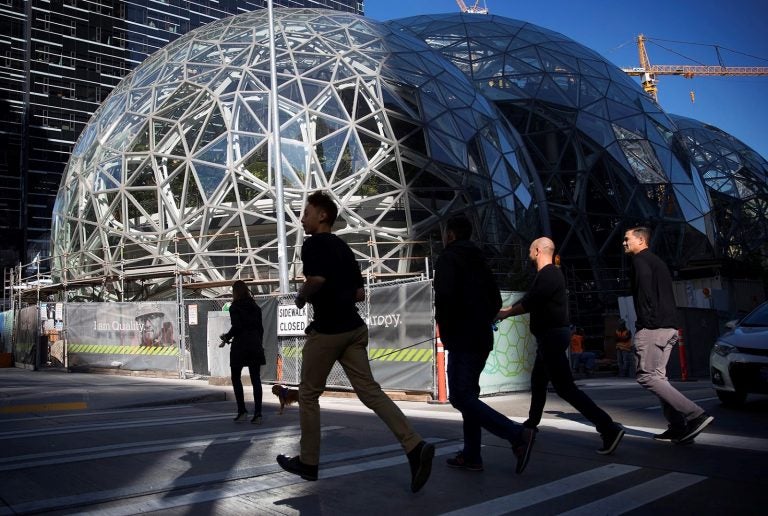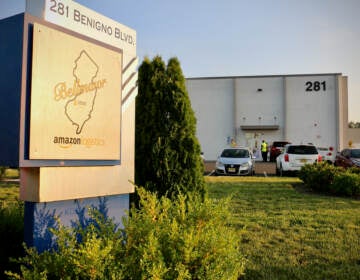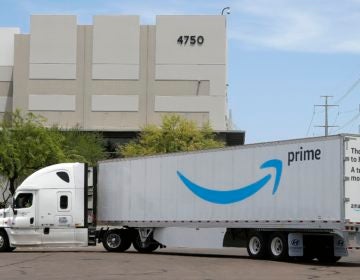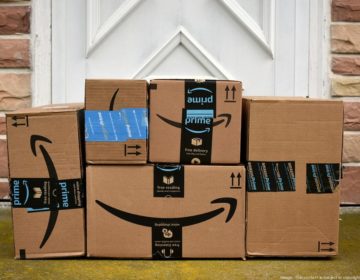Philly’s Amazon HQ2 loss could be a long-term win for city, experts say
Mayor Jim Kenney responded to the news with a thank you to Amazon.
Listen 1:57
Amazon’s headquarters in Seattle. (Megan Farmer/KUOW Photo)
This article originally appeared on PlanPhilly.
—
Philadelphia won’t get the 50,000 jobs and $5 billion in investment that many hoped Amazon would deliver to the city. Instead, its HQ2 package is headed to a pair of rival cities along the northeast corridor.
Amazon announced on Tuesday that it will split its second headquarters into two large satellite offices, one in New York City and the other just outside Washington, D.C. While those two cities, as well as Dallas, Miami, and Chicago, were revisited by Amazon officials in recent months, Philadelphia did not receive additional attention after making the list of 20 finalist sites nearly one year ago.
Mayor Jim Kenney responded to the news with a thank you to Amazon for its consideration and acknowledgement of the collaborative work done across city agencies throughout the competitive process.
“While Philadelphia was not ultimately chosen for Amazon’s HQ2, I thank Amazon for its consideration and am honored that we were among the top contenders,” Kenney said in a statement. “I also recognize the value of this competitive process, which has benefited our city in many ways. It put Philadelphia in the national (and international) spotlight – increasing our visibility to other companies and showing our viability for other large-scale projects.It also required key stakeholders from various sectors to come together like never before and unite around a shared message and strategy for our city.”
Amazon has selected two sites that, like its South Lake Union campus in Seattle, sit in urban areas a few miles removed from the city’s downtown core. The New York City site will be in Queens’ Long Island City, and D.C.’s will be in Crystal City, a neighborhood in Arlington, Va. located just west of Ronald Reagan International Airport.
Both metro areas face significant housing affordability challenges and serious problems with their public transportation systems. But they also boast strengths that Philadelphia lacks in their respective standings as political, financial, and media capitals. While Philadelphia boasts of a growing tech sector and a strong concentration of world-class universities, it still cannot match the level of readily-available tech and business talent in those two cities.
“Philadelphia was always an underdog here,” said John Boyd, a corporate relocation consultant based in Princeton, New Jersey. “Northern Virginia was the strongest, most likely candidate, given the proximity to DC lawmakers, proximity to the [National Institutes of Health], where Amazon is rapidly getting into the health care space.”
Amazon’s CEO, Jeff Bezos, also has a mansion in Washington, D.C. and owns The Washington Post newspaper.
As Amazon looks to expand its government contracting business, a DC-adjacent site offers access to Congress and the White House. Similarly, Amazon is growing its entertainment and media divisions, making a NYC location attractive.
While Philadelphia fell short in the race, the exercise was its own reward, said Boyd. “Philadelphia should feel very good about its presentation to Amazon: Being a top-20 finalist has provided enormous branding value for the city to promote a lot of the pro-business development happening, and its advances … in the growing IT industry.”
“Philadelphia was able to make that case to a global corporate audience, so Philadelphia comes out a winner here despite falling short for Amazon HQ2,” Boyd added.
More than 200 cities eagerly placed bids for HQ2 and yet Amazon has not gone without criticism for its satellite office sweepstakes. Many commentators saw it as pitting cities and states against one another for tax breaks, promoting a race to the bottom that benefits no one other than the company’s shareholders. “It’s called the ‘winner’s curse,’” Robert Inman told WHYY last year.
“In most instances, it’s a zero-sum game. You’ll end up lowering benefits or raising taxes elsewhere in the city to subsidize the relocator with probably little impact on jobs,” said Inman, a professor at the University of Pennsylvania’s Wharton School of Business.
Amazon’s decision to select two predictable sites, where masses of college-educated young professionals already cluster fueled speculation that the fanfared HQ2 bidding process was little more than a marketing gimmick designed to get Amazon the sweetest subsidies possible — and millions of dollars worth of detailed market analysis for hundreds of metropolitan areas.
Many Philadelphians were more anxious than excited about the prospect of Amazon locating a massive office here, fearing it would bring some of the affordability problems that have plagued cities like DC, NYC, and Seattle in recent years. Some large local employers will also quietly celebrate being passed over, said Boyd. “A lot of companies in Philadelphia are going to breath a sigh of relief,“ he said, now that they won’t need to compete fiercely with the invading behemoth to retain their employees and recruit new ones.
Boyd said Philadelphia’s transportation network and cluster of colleges offered competitive advantages, but the city’s relatively high taxes and onerous regulatory regime held it back. Boyd also thought that Philadelphia — and other Amazon also-rans — might see a small boom of development deals in the wake of the announcement. “A lot of projects have been put on hold because of HQ2,” he said. “A lot of companies planning expansions or relocations into cities like Philadelphia have taken a wait and see approach, to see where Amazon goes, because they don’t want to compete with potentially tens of thousands of Amazon workers.”
That question of recruiting young talent, Boyd said, provides Philadelphia reason to be optimistic going forward. “HQ2 site search really has revolutionized — transformed — the site selection industry,” he said. There has been an “emergence of this new site selection driver: social impact.
“We know [that] not only are companies paying attention to this because they want goodwill among lawmakers and the public, but we know that 75 percent of institutional investors look at social impact when they make decisions on where to invest their money,” Boyd said.
Philadelphia was among the poorest of the Amazon finalists. Part of the city’s pitch to the online retailer was the goodwill it would engender providing jobs and investing in a place that desperately needs both. While that pitch ultimately fell short, Boyd thinks the city is well positioned now to make it again.
“Companies are calling us now and asking us to document social impact — that’s never been the case before,” Boyd said. “This is really a new site selection driver, and it’s going to help urban diverse cities like Philadelphia in the months and years ahead in industry attraction efforts.”
Amazon, meanwhile, acted pragmatically when it chose to split the second headquarters into two large satellite offices. Developing two smaller locations will ease real estate acquisition for Amazon and help the company successfully recruit enough employees at each site.
Another benefit will be felt in the political realm. By choosing two sites, Amazon effectively doubles the number of new congressional delegations interested in protecting jobs by looking out for the tech titan’s legislative interests. Those allies will be important as Amazon continues its breakneck growth and likely, faces antitrust challenges.
WHYY is your source for fact-based, in-depth journalism and information. As a nonprofit organization, we rely on financial support from readers like you. Please give today.






